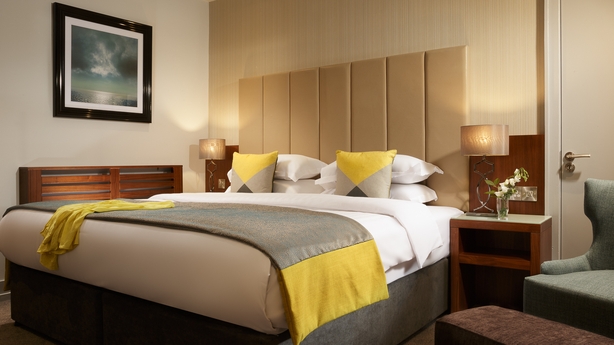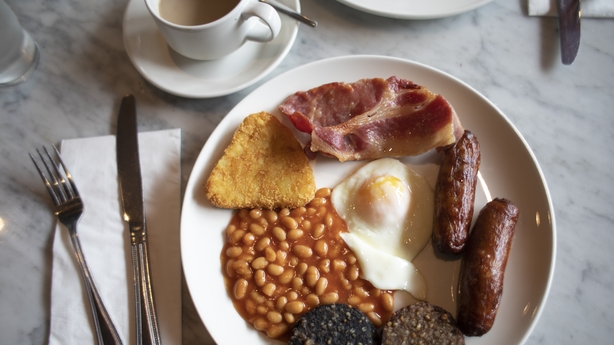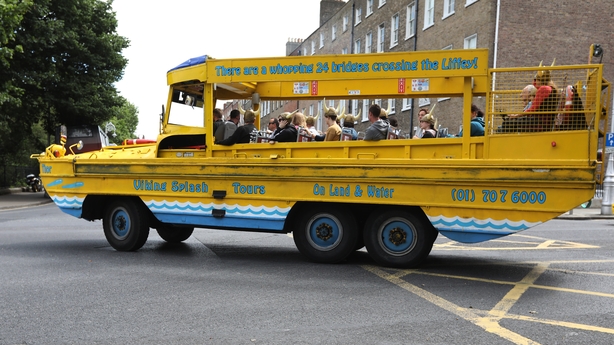This week the Government announced an extension of the 9% reduced VAT rate for the hospitality sector for a further six months.
However, the sector has been criticised for not passing on these savings to consumers.
So is Dublin good value for domestic and international tourists?
On Saturday night, the average price of a four-star hotel room, 1 kilometre from the city centre cost between €160 and €250 per night.
We need your consent to load this rte-player contentWe use rte-player to manage extra content that can set cookies on your device and collect data about your activity. Please review their details and accept them to load the content.Manage Preferences
One Cork visitor to the capital told RTÉ's This Week programme that she could only afford to stay overnight for one night.
"So we only actually came for one night because when I looked at staying a second the hotel room was around €350 for a Saturday night and that was just too much," she said.

One German visitor found the price of hotels in Dublin "quite expensive in comparison to other European cities".
Another visitor from Waterford said when she visited Dublin during the February bank holiday weekend, she found the cost of accommodation in the city expensive.
"We came up for the new bank holiday and hotels were twice the price in comparison to this weekend," she said.
Paul Gallagher, general manager of Buswell's Hotel, said there a lot of reasons as to why rates are growing.
"So there's an extraordinary number of rooms in use in Irish hotels by the State. The State is overdependent on hotels which is distorting the whole value for money prospect.
"I'm not blaming just Government, there are other factors at play," he added, saying hotels are also facing rising costs.
"The costs for Irish hotels are rising, the rates are up 19% since 2019, insurance is up about 60% and energy is up 300%, dairy is up 25%, fish is up 19% and I could go on. There are lots of costs increases and that is directly affecting price," Mr Gallagher said.
Dining out in Dublin is more expensive than London, Paris and Rome with a three-course meal for two coming in at around €80, a recent survey by Bonusetu shows.

For those looking for a lighter lunch, a coffee and sandwich in the city centre can set you back around 412 to €15.
One group of Spanish tourists said Dublin they found eating out in the city expensive.
"For breakfast we paid €7 per person but in Seville we pay around €4 or €5," they said.
Vice president of the Restaurants Association of Ireland Sean Collender expects that cost of dining out will increase when the VAT rate returns to 13.5 % from September.
"It's an extra charge on final prices so that has to be passed on in most cases to the customer. So that will be another cost that the customer sees, I guess.
"From a business point of view most businesses won't be able to absorb that because we are currently absorbing without price increases over the last 24 to 36 months," Sean Collender said.

Many attractions are free of charge in Dublin city but some like the Guinness Storehouse can cost from €22 per person while a trip on the Viking Splash tour starts at €27 for a child.
One family of four who travelled to Dublin from New York for the week said they found attractions quite expensive.
"We visited a number of attractions in Dublin city. In some we dished out around €50 to go in. So that's an overhead expense without the snacks and lunches. We were constantly converting to dollars.
"When you compare the price of attractions here to an institution like the Met in New York which is not that expensive to visit it's very noticeable," the visitor said.
However, Fáilte Ireland's chief executive Paul Kelly says Dublin is still good value for money.
"When you compare them with international benchmarks the attractions in Ireland are very good value for money.
"I mean if you visit attractions in London or in the United States and other European cities you could be paying twice or three times that price. So tourist attractions in Dublin and across Ireland are still very good value for money," Paul Kelly said.







